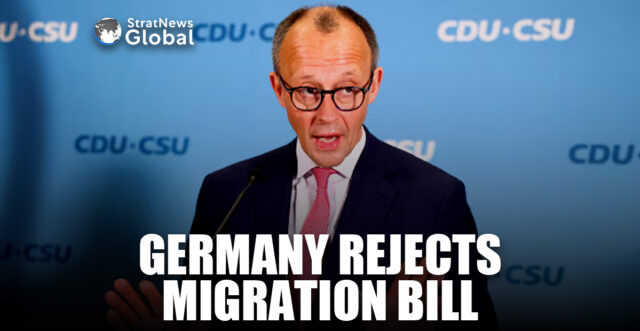Friedrich Merz, once the frontrunner to become Germany’s next chancellor, faced a setback three weeks before the national election when 12 of his own legislators withdrew support for a migration bill, causing its failure in parliament.
Merz, whose conservative bloc has held a comfortable lead in the polls throughout the campaign, had already caused dismay within his party by saying the migration law was so important he was prepared to pass it with support from the far-right, nativist Alternative for Germany (AfD).
Parties Unite Against AfD
Parties of the centre in German politics had previously always joined forces to prevent the AfD, which is under surveillance by Germany’s security services, from achieving legislative power.
Having on Wednesday got a non-binding motion on migration passed in the Bundestag lower house with AfD support, however, Merz lost on Friday at the hands of his own party members, in a blow to his leadership credentials.
‘Entirely Unnecessary’ Move
“This move was entirely unnecessary: Merz had a sizeable lead in the polls, and could have just sailed to the elections,” Thu Nguyen, deputy director of the Berlin-based Jacques Delors Centre, an EU policy think tank, wrote on social media platform Bluesky.
“Instead, he deliberately chose to rely on the support of the AfD to get a majority – twice,” she added, deeming the possibility of a stable German government as “further away than ever” after the vote.
The draft would have restricted family reunifications for some refugees and called for more people to be refused at the border. Two-thirds of the public support stronger immigration rules, according to a recent poll.
‘A Necessary Response’
Merz had argued that the bill was a necessary response to a series of high-profile killings in public spaces by people with an immigrant background. But the Social Democrats (SPD) and Greens said the proposals would not have stopped the attacks and violated European law.
Chancellor Olaf Scholz of the SPD said in a video on Instagram: “Will we continue to confront complex problems in future or will we capitulate to the empty promises of the far right? How we answer these questions will define what kind of country we live in.”
It remains to be seen if the defeat affects party standings, where the SPD and their Green coalition partners, on 15% and 13% respectively, are far behind the conservatives’ 30%.
AfD Criticises Merz
The AfD, second in the polls and flush from their first parliamentary victory in helping pass Wednesday’s resolution, criticised Merz for failing to gather enough support for Friday’s law.
“Merz doesn’t have what it takes to be chancellor,” AfD leader Alice Weidel told reporters. “The conservatives aren’t united.”
(With inputs from Reuters)





